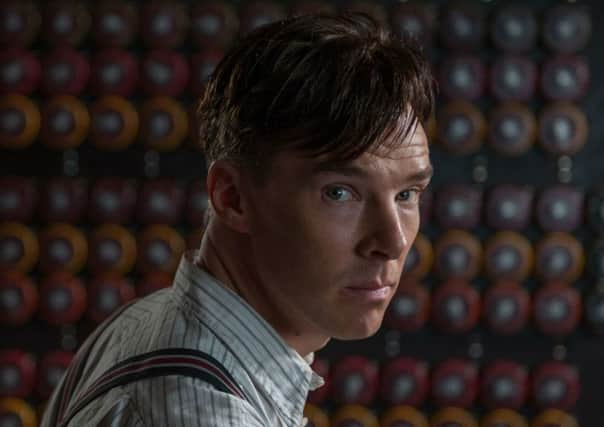Natalie Stendall reviews new film The Imitation Games


The ‘imitation’ extends beyond German cryptography to Turing’s difficulties with social interaction and homosexuality.
The Norwegian director, whose last movie (the intense and gory thriller, Headhunters) was BAFTA nominated, said it was ‘a privilege and honour to be able to tell this story’. The Imitation Game couldn’t be more different from his fast paced thriller. It’s slow burning, told in three different time frames and saves its emotional punch until a mere few minutes before the credits. There have been more exciting stories told in cinema this year, but few are as worthy.
Advertisement
Hide AdAdvertisement
Hide AdThe Enigma code and its significance in the war effort have been well documented, something that poses a problem for the creation of suspense. Yet Graham Moore’s screenplay is insistent on re-telling the story, swallowing up the largest part of the film.
Moore’s focus is undeniably Turing and his screenplay succeeds in righting the historical wrongs of the 2001 film Enigma (starring Kate Winslet and based on a fictional thriller by Robert Harris) but it sits uneasily between thriller and biography.
The Imitation Game is most captivating when it explores Turing’s formative years - a period of intense bullying and burgeoning friendship with another young man - and his
later arrest for public indecency in 1952 which Moore and Tyldum use to frame the film.
Advertisement
Hide AdAdvertisement
Hide AdTuring’s work on the Enigma code cements these two periods. It’s used by Tyldum to explore Turing’s fragmentary interpersonal relationships and unusual yet compelling
symbiotic with female colleague Joan (Keira Knightley). It’s here where Tyldum’s film begins to feel overstuffed while leaving little space to examine the lesser known, but no less significant, aspects of Turing’s post-war work.
As a character study then, The Imitation Game has mixed success. In his explorations of difference, Tyldum sinks too easily, too often, into a light-hearted tone, something
that risks destroying the gravitas of his entire film. It’s often a little too obvious when the director is seeking to elicit the endearing side of Turing’s strangeness. In one largely comic scene, Turning uncomfortably offers his Enigma colleagues an apple before cracking an over-rehearsed joke: part of Joan’s guide to making friends in the workplace. It’s the early 1940s and Autism and Aspergers are new fields, outside the popular frame of reference.
Advertisement
Hide AdAdvertisement
Hide AdThe audience laughs, but it’s uncomfortable. Are we laughing with Turing? At him? Or maybe at his colleagues? It feels perilously unclear.
Instead it’s the exceptional performance from Benedict Cumberbatch that makes The Imitation Game a fitting tribute to the extraordinary Turing. His Turing is logical, blunt, at times naive, bringing subtlety to Turing’s rarely faltering self-confidence. Cumberbatch creates a whole range of vocal inflections that are perfectly synchronised with Alex Lawther (the young Turing) who delivers one of the most refined youth performances of recent years.
Cumberbatch has already proved he can play the logical intellectual (Sherlock), the driven eccentric (The Fifth Estate) and the sweetheart who continues to love in the face of society (August: Osage County). Here he combines it all into a role that’s built perfectly for him and he capably rescues The Imitation Game’s most twee dialogue with sensitive delivery.
Where Moore’s screenplay provides a sharp and poignant exchange, Cumberbatch delivers an emotional punch. ‘How is that different from talking?’ Turing asks, ‘They expect
you to know what they mean, only I never do’.
Advertisement
Hide AdAdvertisement
Hide AdFor all his efforts to focus on difference, Tyldum gives us a film that’s remarkably familiar.
Turing’s lesser known, post-war work on early computers and artificial intelligence is a mere footnote, his homosexuality referenced in a handful of conversations. Tyldum leaves it until the last moment to unite his film’s themes: to take The Imitation Game far beyond the realms of both average thriller and biopic. And so the sparse attention to Turing’s life post-war has just one advantage. It makes the film’s conclusion especially shocking.
Here Tyldum succeeds in turning the viewer’s intense pride into penetrating guilt, twisting his wartime drama into an emotional work on gay rights. In one final moment Tyldum tells Turing everything Britain wishes it had. It’s a beautifully written scene that, in the moment, redeems The Imitation Game’s flaws.
In spite of the sentimental dialogue, the uneasy, light-hearted tone, the imperfect balance between pre-and-post war and the struggle to create suspense, The Imitation Game
Advertisement
Hide AdAdvertisement
Hide Ademerges to feel like a fitting tribute to an exceptional man. Benedict Cumberbatch never seems at sea in Tyldum’s flawed film, bringing conviction to every single scene. It’s clear he could have handled a meatier screenplay and in The Imitation Game’s final scenes we get a glimpse of what such a film might have looked like. Turing’s whole life is distilled into a single blistering moment. It’s a compelling ending that both redeems Tyldum’s film and chastises it for failing to deliver this emotional weight throughout.
The Imitation Game opens on November 14.
Verdict: 4/5
NATALIE STENDALL